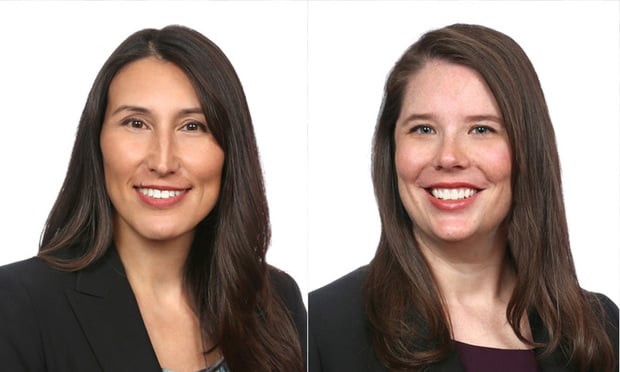A Few Tips on How to Succeed as an Associate
By taking steps to make themselves indispensable, associates can ensure that partners will never want to work without them.
October 07, 2019 at 11:56 AM
6 minute read
 Shari Klevens (left) and Alanna Clair, Dentons. (Courtesy photo)
Shari Klevens (left) and Alanna Clair, Dentons. (Courtesy photo)
Law school teaches students about the history of the law, the critical thinking skills necessary to analyze issues and the foundation of our legal system. However, critics of the law school curriculum note that the program does not always teach new attorneys the nuances of how to practice law. So when new law school graduates join law firms, they are not always ready to hit the ground running.
Some law students, even those at the top of their class, feel lost once practice begins, particularly if they begin their careers in a jurisdiction where knowledge of local practice is paramount.
Although law firms often invest significant resources into training new associates, associates can still sometimes feel overwhelmed by the expectations, particularly given the stark differences between law school life and life as a junior associate in a law firm. Here are some tips for recent law school graduates to help develop a successful career in private practice.
Business Development for Junior Lawyers
For most junior associates, having one's own clients is a prospect that is years away. However, that does not mean there's nothing associates can do in the meantime to get started on the right path. Indeed, many successful law firm partners built their practices from the bottom up, with the skills and relationships developed as junior lawyers as the foundation.
Of course, junior attorneys can develop relationships with peers—whether from law school or elsewhere—who may someday be potential clients. And, getting involved in the bar, the firm, an alumni group or the community can help develop a reputation that can be expanded upon when the associate is in a position to put together his or her own book of business. At the outset, however, development of core skills is one of the best things that junior lawyers can do to ensure later business development.
Treat Partners as Clients
For most associates, work and opportunity comes from the partners on their own team. By taking steps to make themselves indispensable to those people, associates can ensure that those partners will never want to work without them, which also helps associates create job security for themselves.
Another benefit of that approach is that there can be opportunities for junior associates to work directly with more senior colleagues' clients, where the junior associate has demonstrated his or her value. Because a partner's relationship with a client may be the result of several years of work, the partner may be wary of introducing the client to an associate who may not meet expectations. Thus, until associates have clients of their own, treating the partner they work for like a client can be a strong path to success. Being responsive, timely with work product, and personable are traits that may lead a partner to trust associates with that partner's client relationships.
Ask for Help
From time to time, ethical issues may arise that create challenges to the practice of law. It can be helpful for associates to familiarize themselves with the rules upon beginning practice to help associates ensure that they are acting ethically. Indeed, all attorneys at all levels have an obligation to ensure compliance with the Rules of Professional Conduct.
Rule 5.2(a) of the Georgia Rules of Professional Conduct states that "[a] lawyer is bound by the Georgia Rules of Professional Conduct notwithstanding that the lawyer acted at the direction of another person."
If a junior associate has concerns about whether he or she is being asked to violate a rule of professional conduct or if he or she is otherwise facing an ethical dilemma, one option is to ask questions and seek help, whether from in-house counsel, a mentor or some other person who handles issues of risk. Law school may not always prepare junior associates to respond to real-life ethical dilemmas, so junior associates do not need to be afraid to ask for help. Sometimes, all that is needed is a second opinion to confirm that you are on the right path.
Revenue and Profitability Matters
At its core, law firm economics are quite simple—revenues, in the form of fees received for billable hours, must exceed costs, namely salaries and other expenses. Thus, a law firm's ability to meet its financial goals is often predicated on associates meeting their billable hour expectations and working efficiently. The practice of law can be a demanding profession, but it can be helpful for junior associates to keep in mind that the success of the law firm can be impacted by whether the associates keep up with their assignments or devote too much time to nonbillable efforts.
It goes without saying, however, that this does not mean that the most successful associates are those that overbill the file. In fact, those associates may find themselves in trouble as well. It is not uncommon for a zealous associate to dedicate significant hours to a project, only to learn that many of the hours cannot be billed because the associate has completely blown the budget for the matter. It can be helpful, then, for associates to ask the more senior members of their team how much time the associate should be expected to spend on a specific assignment or to ask if there is a budget that has been set for their work.
Learning best practices—both for the specific law firm and under the rules of professional conduct—and receiving constructive criticism from supervisors can help associates increase their individual profitability, which is a potential indicator of long-term success.
Shari L. Klevens is a partner at Dentons in Atlanta and Washington, D.C., and serves on the firm's U.S. board of directors. She represents and advises lawyers and insurers on complex claims and is co-chair of Dentons' global insurance sector team.
Alanna Clair, also a partner at the firm in Washington, focuses on professional liability and insurance defense. Klevens and Clair are co-authors of "The Lawyer's Handbook: Ethics Compliance and Claim Avoidance" and the upcoming 2020 edition of "Georgia Legal Malpractice Law."
This content has been archived. It is available through our partners, LexisNexis® and Bloomberg Law.
To view this content, please continue to their sites.
Not a Lexis Subscriber?
Subscribe Now
Not a Bloomberg Law Subscriber?
Subscribe Now
NOT FOR REPRINT
© 2025 ALM Global, LLC, All Rights Reserved. Request academic re-use from www.copyright.com. All other uses, submit a request to [email protected]. For more information visit Asset & Logo Licensing.
You Might Like
View All

Alston & Bird, Baker Hostetler, Holland & Knight Promote Partners in Southeast
5 minute read

Trending Stories
- 1President-Elect Donald Trump Sentenced to Unconditional Discharge
- 2JCPenney Customer's Slip-and-Fall From Bodily Substance Suit Best Left for a Jury to Decide, Judge Rules
- 3Products Liability: The Absence of Other Similar Claims—a Defense or a Misleading Effort to Sway a Jury?
- 4529 Accounts Are Not Your Divorce Piggybank
- 5Meta Hires Litigation Strategy Chief, Tapping King & Spalding Partner Who Was Senior DOJ Official in First Trump Term
Who Got The Work
Michael G. Bongiorno, Andrew Scott Dulberg and Elizabeth E. Driscoll from Wilmer Cutler Pickering Hale and Dorr have stepped in to represent Symbotic Inc., an A.I.-enabled technology platform that focuses on increasing supply chain efficiency, and other defendants in a pending shareholder derivative lawsuit. The case, filed Oct. 2 in Massachusetts District Court by the Brown Law Firm on behalf of Stephen Austen, accuses certain officers and directors of misleading investors in regard to Symbotic's potential for margin growth by failing to disclose that the company was not equipped to timely deploy its systems or manage expenses through project delays. The case, assigned to U.S. District Judge Nathaniel M. Gorton, is 1:24-cv-12522, Austen v. Cohen et al.
Who Got The Work
Edmund Polubinski and Marie Killmond of Davis Polk & Wardwell have entered appearances for data platform software development company MongoDB and other defendants in a pending shareholder derivative lawsuit. The action, filed Oct. 7 in New York Southern District Court by the Brown Law Firm, accuses the company's directors and/or officers of falsely expressing confidence in the company’s restructuring of its sales incentive plan and downplaying the severity of decreases in its upfront commitments. The case is 1:24-cv-07594, Roy v. Ittycheria et al.
Who Got The Work
Amy O. Bruchs and Kurt F. Ellison of Michael Best & Friedrich have entered appearances for Epic Systems Corp. in a pending employment discrimination lawsuit. The suit was filed Sept. 7 in Wisconsin Western District Court by Levine Eisberner LLC and Siri & Glimstad on behalf of a project manager who claims that he was wrongfully terminated after applying for a religious exemption to the defendant's COVID-19 vaccine mandate. The case, assigned to U.S. Magistrate Judge Anita Marie Boor, is 3:24-cv-00630, Secker, Nathan v. Epic Systems Corporation.
Who Got The Work
David X. Sullivan, Thomas J. Finn and Gregory A. Hall from McCarter & English have entered appearances for Sunrun Installation Services in a pending civil rights lawsuit. The complaint was filed Sept. 4 in Connecticut District Court by attorney Robert M. Berke on behalf of former employee George Edward Steins, who was arrested and charged with employing an unregistered home improvement salesperson. The complaint alleges that had Sunrun informed the Connecticut Department of Consumer Protection that the plaintiff's employment had ended in 2017 and that he no longer held Sunrun's home improvement contractor license, he would not have been hit with charges, which were dismissed in May 2024. The case, assigned to U.S. District Judge Jeffrey A. Meyer, is 3:24-cv-01423, Steins v. Sunrun, Inc. et al.
Who Got The Work
Greenberg Traurig shareholder Joshua L. Raskin has entered an appearance for boohoo.com UK Ltd. in a pending patent infringement lawsuit. The suit, filed Sept. 3 in Texas Eastern District Court by Rozier Hardt McDonough on behalf of Alto Dynamics, asserts five patents related to an online shopping platform. The case, assigned to U.S. District Judge Rodney Gilstrap, is 2:24-cv-00719, Alto Dynamics, LLC v. boohoo.com UK Limited.
Featured Firms
Law Offices of Gary Martin Hays & Associates, P.C.
(470) 294-1674
Law Offices of Mark E. Salomone
(857) 444-6468
Smith & Hassler
(713) 739-1250






